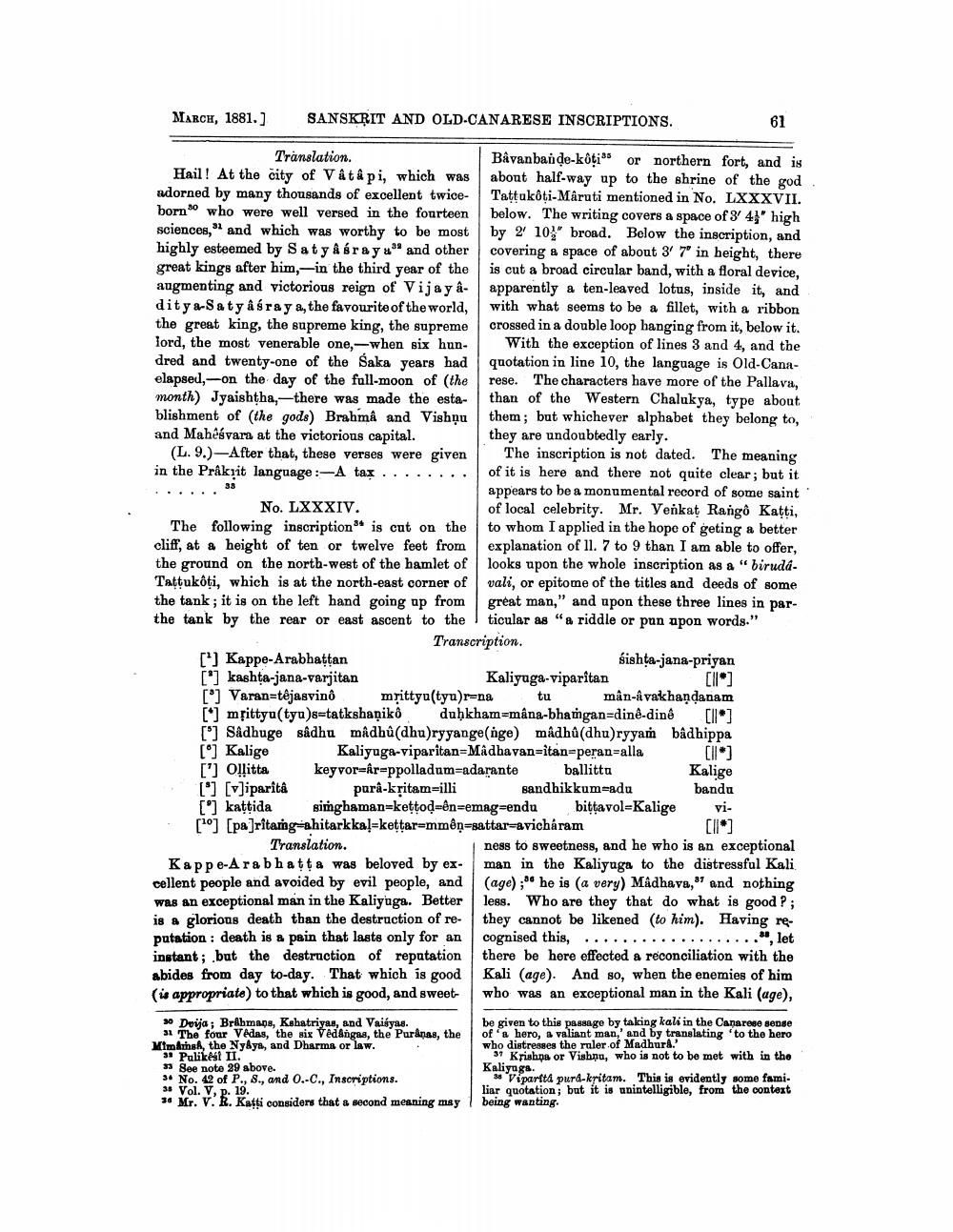________________
MARCH, 1881.]
SANSKRIT AND OLD-CANARESE INSCRIPTIONS.
Translation.
32
Hail! At the city of Vâtâpi, which was adorned by many thousands of excellent twiceborn who were well versed in the fourteen sciences," and which was worthy to be most highly esteemed by Satyasraya3 and other great kings after him,-in the third year of the augmenting and victorious reign of Vijay âditya-Satyasra y a, the favourite of the world, the great king, the supreme king, the supreme lord, the most venerable one,-when six hundred and twenty-one of the Saka years had elapsed, on the day of the full-moon of (the month) Jyaishtha,-there was made the establishment of (the gods) Brahmâ and Vishnu and Mahêévara at the victorious capital.
(L. 9.)-After that, these verses were given in the Prâkrit language:-A tax
35
The inscription is not dated. The meaning of it is here and there not quite clear; but it appears to be a monumental record of some saint of local celebrity. Mr. Venkat Rangô Kaṭṭi, to whom I applied in the hope of geting a better explanation of 11. 7 to 9 than I am able to offer, looks upon the whole inscription as a "birudávali, or epitome of the titles and deeds of some great man," and upon these three lines in particular as "a riddle or pun upon words." Transcription.
śishta-jana-priyan [*]
Kaliyuga-viparitan mrittyu(tyu)r-na tu
mân-âvakhandanam
['] Kappe-Arabhaṭṭan [*]kashta-jana-varjitan [] Varan-têjasvinô [*]mrityu(ty)-tatkahanika duḥkham-mâna-bhamgan-dinê-dinê [*] [] Sadhuge sidhu madhù(dha)ryyange(age) midhadhu)ryyam badhippa [*] Kalige
['] Ollitta [*] [v]iparit pari-kritam-illi [*] kaṭṭida simghaman-keṭṭod=ên-emag-endu bitṭavol-Kalige [10] [pa]ritamgahitarkkal-kettar-mmên-sattar-avicharam
No. LXXXIV.
The following inscription is cut on the cliff, at a height of ten or twelve feet from the ground on the north-west of the hamlet of Taṭṭukôti, which is at the north-east corner of the tank; it is on the left hand going up from the tank by the rear or east ascent to the
Kaliyuga-viparitan-Madhavan-itan-peran-alla
Translation.
33 Palikel II.
53 See note 29 above.
key vor-k-ppolladum-ndarante ballittu sandhikkum=adu
Kappe-Arabhatta was beloved by excellent people and avoided by evil people, and was an exceptional man in the Kaliyuga. Better is a glorious death than the destruction of reputation: death is a pain that lasts only for an instant; but the destruction of reputation abides from day to-day. That which is good (is appropriate) to that which is good, and sweet
61
Bâvanbande-kôtis or northern fort, and is about half-way up to the shrine of the god Taṭṭukoti-Mâruti mentioned in No. LXXXVII. below. The writing covers a space of 3' 4" high by 2' 10" broad. Below the inscription, and covering a space of about 3' 7" in height, there is cut a broad circular band, with a floral device, apparently a ten-leaved lotus, inside it, and with what seems to be a fillet, with a ribbon crossed in a double loop hanging from it, below it.
With the exception of lines 3 and 4, and the quotation in line 10, the language is Old-Canarese. The characters have more of the Pallava, than of the Western Chalukya, type about. them; but whichever alphabet they belong to, they are undoubtedly early.
so Deija; Brahmans, Kshatriyas, and Vaisyas.
31 The four Védas, the six Vêdangas, the Puranas, the Mimams, the Nyaya, and Dharma or law.
3 No. 42 of P., S., and O.-C., Inscriptions.
38 Vol. V, p. 19.
36 Mr. V. R. Katti considers that a second meaning may
[י]
Kaligo bandu vi[11]
ness to sweetness, and he who is an exceptional man in the Kaliyuga to the distressful Kali (age); he is (a very) Mâdhava," and nothing less. Who are they that do what is good?; they cannot be likened (to him). Having recognised this, ."", let there be here effected a reconciliation with the Kali (age). And so, when the enemies of him who was an exceptional man in the Kali (age),
be given to this passage by taking kali in the Canarese sense of a hero, a valiant man,' and by translating to the hero who distresses the ruler of Madhura.'
37 Krishna or Vishnu, who is not to be met with in the Kaliyuga.
38 Vipartta pura-kritam. This is evidently some familiar quotation; but it is unintelligible, from the context being wanting.




